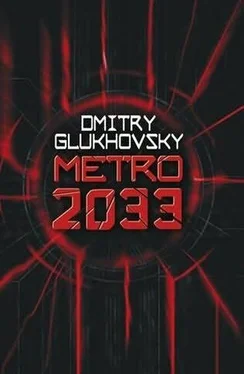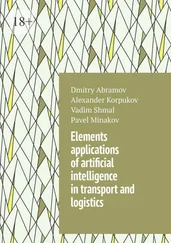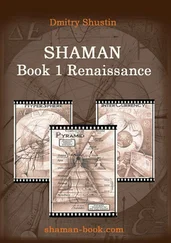They went past the broken down door to an abandoned administrative room. Maybe it was a lavatory or maybe before it was a refuge… Full of furniture: iron bunk-beds and crude plumbing – it was all stolen long ago and nowadays no one tried to get into those dark empty rooms scattered along the length of the tunnels. There’s nothing there… But truth is, you never know!
There was a weak blinking light ahead. They were approaching Alekseevskaya. The station was minimally populated, and the patrol consisted of one person, at the fiftieth-metre – they couldn’t allow themselves to go any further. The commander gave the order to stop at forty metres from the fire that had been lit by the patrol at Alekseevskaya – and he turned his flashlight on and off several times in a precise sequence, giving the patrol a signal. A black figure was delineated by the light of the flames – a scout was coming towards them. From far off, the scout yelled, ‘Halt! Don’t approach!’
Artyom asked himself: Could it be possible that one day they wouldn’t be recognized at a station with whom they considered themselves to have friendly relations, and they would be met with hostility?
The person was approaching them slowly. He was dressed in torn camouflage trousers and a quilted jacket which displayed the letter ‘A’ in bold – apparently from the first letter in the station’s name. His hollow cheeks were unshaven, and his eyes gleamed suspiciously, and his hands were nervously stroking the body of an automatic machine gun that was hanging from his neck. He looked them right in the face and smiled – he recognized them and, with a little wave showing his trust, he pushed the machine gun onto his back.
‘Great, guys! How are you doing? Is it you guys heading to Rizhskaya? We know, we know, they warned us. Let’s go!’
The commander started to ask the patrolman something but it was inaudible, and Artyom, hoping that he also wouldn’t be heard, said quietly to Zhenya:
‘He looks overworked and underfed. I don’t think they want to join forces with us because they’re having the good life.’
‘Well, so what?’ His friend responded. ‘We also have our interests in the matter. If our administration is pursuing it then it means there’s something they want from it. It’s not out of charity that we are coming to feed them.’
They went past the campfire at the fiftieth-metre where a second patrolman was sitting, dressed just like the one who had met them, and their cart rolled towards the station. Alekseevskaya was badly lighted and the people that lived there looked sad and seemed to speak little. At VDNKh, they looked on guests with friendliness. The group stopped in the middle of the platform and the commander announced a smoking break. Artyom and Zhenya stayed on the cart to protect it and the others were called to the fireside.
‘I’ve never heard about the fascists and the Reich,’ Artyom said.
‘I’ve heard that there were fascists somewhere in the underground, ’ Zhenya answered, ‘but they only said that they were at Novokuznetskaya.’
‘Who told you?’
‘Lekha did,’ Zhenya admitted reluctantly.
‘He’s told you a lot of other interesting things,’ Artyom reminded him.
‘But there really are fascists there! The guy just got the wrong place. He wasn’t lying OK?!’ Zhenya said in defence. Artyom became silent and sank into thought. The smoking break at Alekseevskaya was supposed to last no less than a half hour. The commander was having some kind of conversation with the local leader – probably about the future cooperation. Afterwards, they were supposed to push on forward, so that they would make it to Rizhkaya by day’s end. They would spend the night there, decide what needed deciding, and look at the newly discovered cable, and then they would send a messenger back to ask for their next instructions. If the cable could be used for communication between three stations then it made sense to unwind it and to open up a telephone connection. But if it looks unusable then it would be necessary to return to the station at once.
So Artyom had dispensation for no more than two days. During this time, it would be necessary to invent a pretext under which it would be possible to get though the external cordons of Rizhskaya, who were even more suspicious and nit-picking than the external patrols at VDNKh. Their lack of trust was totally understandable: there, in the south, the wider metro system began, and the southern cordon of Rizhskaya was subjected to attacks pretty often. And though the dangers that were threatening the population of Rizhskaya were not as mysterious and frightening as those hanging over VDNKh, they were different in their amazing variation. The fighters that defended the southern approach to Rizhskaya never knew what to expect, and therefore they had to be ready for everything.
Two tunnels go from Rizhskaya to Prospect Mir. To collapse one of them for some reason didn’t seem possible, and the Rizhskys had to put blockades up in both. But this took such a toll on their forces that it became vitally important for them to at least secure the northern tunnel. They joined forces with Alekseevskaya and more importantly, with VDNKh, and shifted the burden of defence in the northern direction onto them, which provided some peace in the tunnels between stations, so that they could focus on their domestic goals. And at VDNKh, they saw this as an opportunity to widen their sphere of influence.
In light of the imminent union, the outposts of Rizhskaya were showing increased vigilance: it was necessary to prove to their future allies that they could be counted on to defend the southern borders. That’s why it seemed a particularly difficult task to get through the cordons in either direction. And Artyom had a maximum of two days to figure it out.
However, despite the complexities, it didn’t seem impossible. The question lay in what he would do after that. Even if he got through the southern outposts, it would be necessary still to find a sufficiently safe route to Polis. Since he had had to make an urgent decision, he hadn’t had time in VDNKh to think about his next moves to make it to Polis. At home, he could have asked traders he knew about the dangers out there, without raising suspicions. And he knew that he would raise suspicions immediately if he asked Zhenya or anyone else in the group about the way to Polis – and Zhenya would definitely know that Artyom was up to something. He didn’t have friends at Alekseevskaya or at Rizhskaya, and he couldn’t trust mere acquaintances with these questions either.
Having taken advantage of the fact that Zhenya walked off to chat with a girl who was sitting nearby on the platform, Artyom furtively got a tiny map of the metro out of his rucksack. It was printed on the back of a card with charred edges that was advertising a market fair (that had been and gone long ago), and he circled Polis a few times with a pencil.
The way to Polis looked easy and short. In the ancient, mythical times that the commander had been describing when people didn’t have to carry weapons, and they went from station to station, even if they had to change trains and take another line – in the times, when the journey from one end to the opposite end, didn’t take more than an hour – in the times when the tunnels were only populated by rattling and rushing trains – back then the distance between VDNKh and Polis would have been quick and clear.
It was directly along the line to Turgenevskaya and from there a pedestrian tunnel to Chistye Prudy, as it was called on the old map, which Artyom was examining. Or take the Kirovskaya line and the Red Line, the Sokolnicheskaya line – straight to Polis… In the era of trains and fluorescent light, such a trip would take about thirty minutes. But ever since the words ‘Red Line’ had been written in capital letters, and the red calico banner had hung over the pedestrian tunnel to Chistye Prudy, there was no point even thinking of a short-cut to Polis.
Читать дальше











